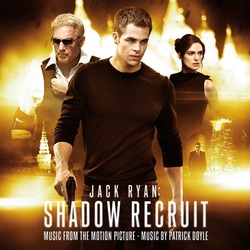
While the first person that most people think about when they hear Kenneth Branagh's name is William Shakespeare, the second would undoubtedly be Patrick Doyle. The Scottish composer is perhaps best known for his collaborations with the director, his first score (the exceptional Henry V) accompanying Branagh's directorial debut. Since then, the two have remained faithful collaborators, producing some fantastic works together, from the aforementioned Henry V to Much Ado About Nothing to Mary Shelley's Frankenstein. As Branagh has made the transition to slightly more commercial fare in recent years, Doyle has remained faithful. Thor saw the composer adapting his style for the dominating Remote Control blockbuster sound, his ostinatos and power anthems ringing with a little more classical panache and organic subtlety than the norm. With Jack Ryan: Shadow Recruit, the composer further toys with this contemporary sound, creating a slightly above average spy thriller score.
The most important thing to remember going into Jack Ryan: Shadow Recruit is that Hamlet it is not. Much to the chagrin of the composer's most ardent fans, Shadow Recruit doesn't really afford Doyle many opportunities to explore his usual lush orchestrations and noble fanfares. They're simply not what this kind of film demands. Much of Shadow Recruit, rather, is in the style of sleek, modern action fare. Pulsating electronics, driving rhythms, swift string ostinatos, and cool beats dominate this outing, amounting to some well-constructed, contemporary action material (too much, in fact, but we'll come to that). All this being said, Doyle isn't exactly compromising his own style; rather, he's adapting it and paring it down to suit the needs of this film. And even so, there's actually a lot more Doyle to this score than most people recognize, a number of motifs woven into the score's fabric that begin to reveal themselves after repeated listenings.
In what will undoubtedly be the highlight of the score for many, Doyle's grander orchestral side gets to shine through in the patriotic "Ryan, Mr. President". The main theme of the score, "Ryan, Mr. President" balances well the minor-key brawn expected of contemporary action-thrillers with Doyle's typical major-key fanfares. Though presented in a roughly three and a half minute concert suite on album, in film this standout cue suffers from being cut short in favor of the concluding "Shadow Recruit". While perhaps in not as frequent a manner as one would hope, the theme heard in "Ryan, Mr. President" recurs a few times throughout the score. Aside from that cue, its fullest variation can be heard at the conclusion of "Second Great Depression" and "Jack and Aleksandr", the latter constituting a welcome bit of valorous writing. It also informs a variation of the theme on tender piano, featured in "Shadow Accounts", "The Activation", and "Picking This Life", and another in "The Engagement". The spare, tender piano cues of this score shouldn't go unnoticed amidst all of the high-octane techno-thriller writing.
The cue that seems to inform much of the action material in Doyle's score is "Shadow Recruit", the sleek, very contemporary sounding concluding cue. A strong beat drives this one, with pulsating electronics, swift strings, and wetly mixed piano amounting to an undeniably edgy sound. Doyle deconstructs this sound across many of the action cues, the opening string chords appearing in "The Window Reflection", "The Lightbulb", and, more transparently, "Bike Chase", with the cue's cool piano motif featuring in "The United Nations" and the quietly tense "Rooftop Call". The underlying theme of "Shadow Recruit", denoted by the string idea heard most prominently at 1:51 in the cue, also makes an appearance in the final minutes of "Moscow Car Chase".
The composer also makes some minor nods to the film's predominant setting: a sleek, contemporary Moscow. Though regrettably receiving little prominence in the film, the choral "Faith of Our Fathers" will be another standout for fans of Doyle's more classical work. Adapted from existing lyrics and translated into Russian, the cue features deep male voices singing a solemn hymn evocative of Basil Poledouris's own Jack Ryan effort, The Hunt for Red October. Remnants of this hymn occur intermittently throughout the score, as in the midsection of "Stealing the Data". Doyle further attempts to give portions of the score a minor indigenous flare by way of a treated balalaika, a three-stringed, Russian folk instrument.
In the end, Patrick Doyle's Jack Ryan: Shadow Recruit doesn't really distinguish itself amongst the composer's lengthy filmography, but it's a more adept, nuanced contemporary thriller score than most people seem to acknowledge. What makes it suffer, though, is a lengthy album presentation. Many of the score's highlights are spread across an excessive hour and fifteen minutes of music, which simply does not sustain the listener's interest. While it does not have as egregious an effect as the hour and forty-two minute runtime of Brian Tyler's Assassin's Creed IV: Black Flag, the score might have been better received had it been significantly condensed. Despite the redeeming qualities of "Ryan, Mr. President", ardent fans of Patrick Doyle will likely be disappointed by this whole experience. Many will see Jack Ryan: Shadow Recruit as an abandonment of Doyle's style, a mimicry on his part of more accomplished efforts by John Powell, but I'd argue that there's more Doyle in here than most people recognize and its in those moments that this score begins to shine.
| A Few Recommended Tracks: "Shadow Accounts", "Rooftop Call", "Faith of Our Fathers", "The Lightbulb", "Chopper to NYC", "Ryan, Mr. President", "Shadow Recruit" Label: Varese Records Availability: 24 track edition | |

 RSS Feed
RSS Feed
